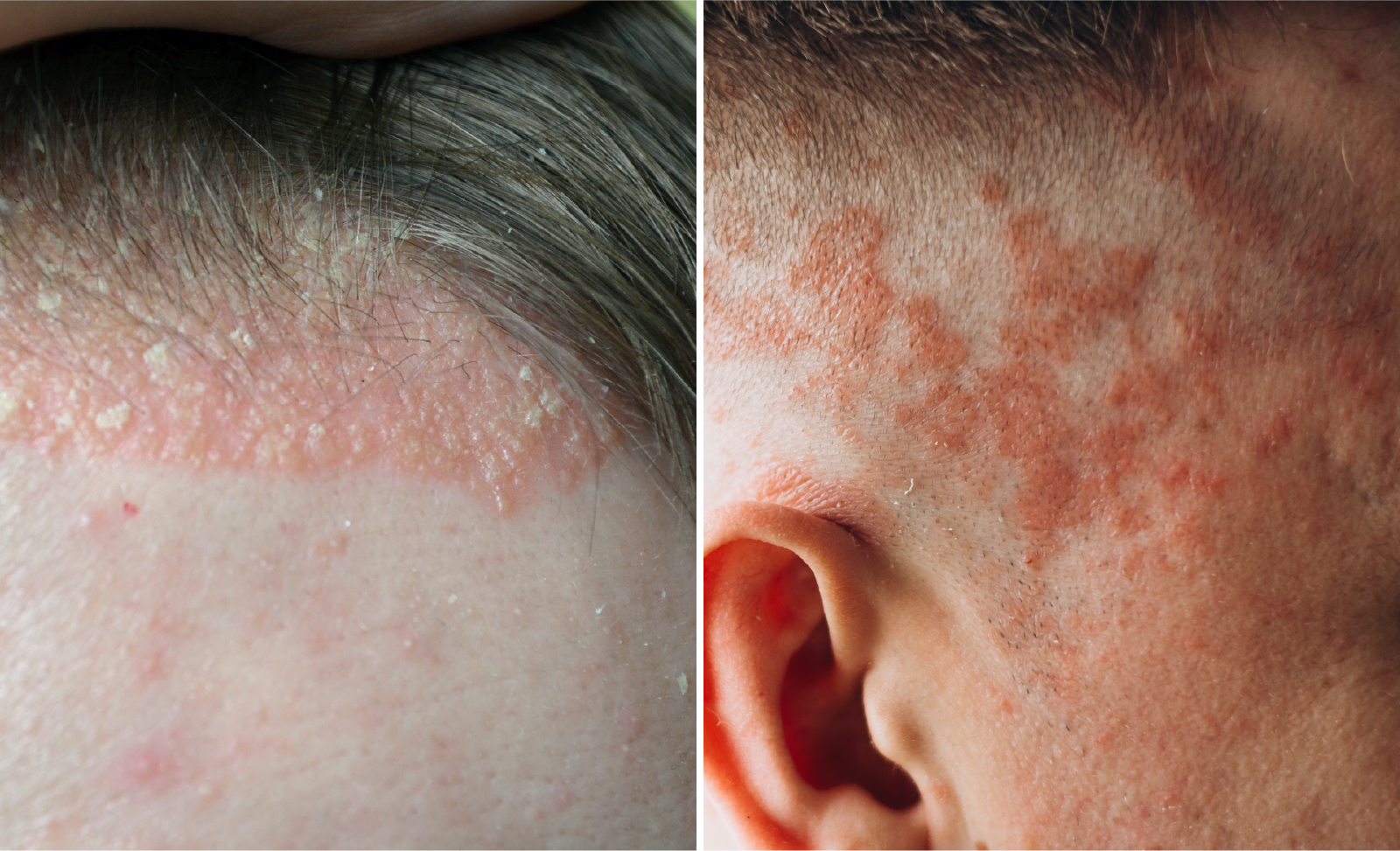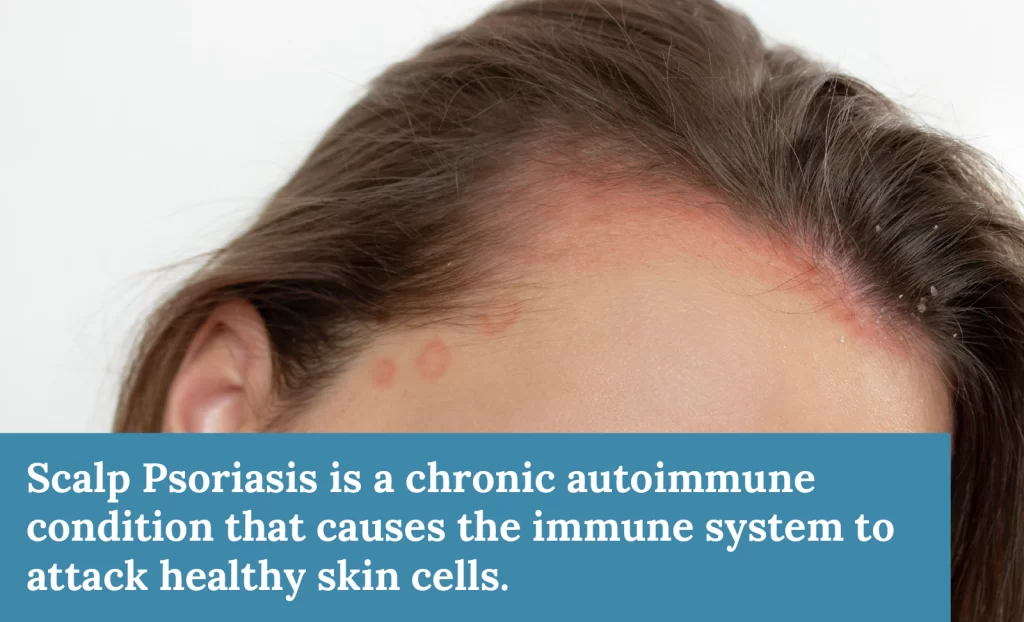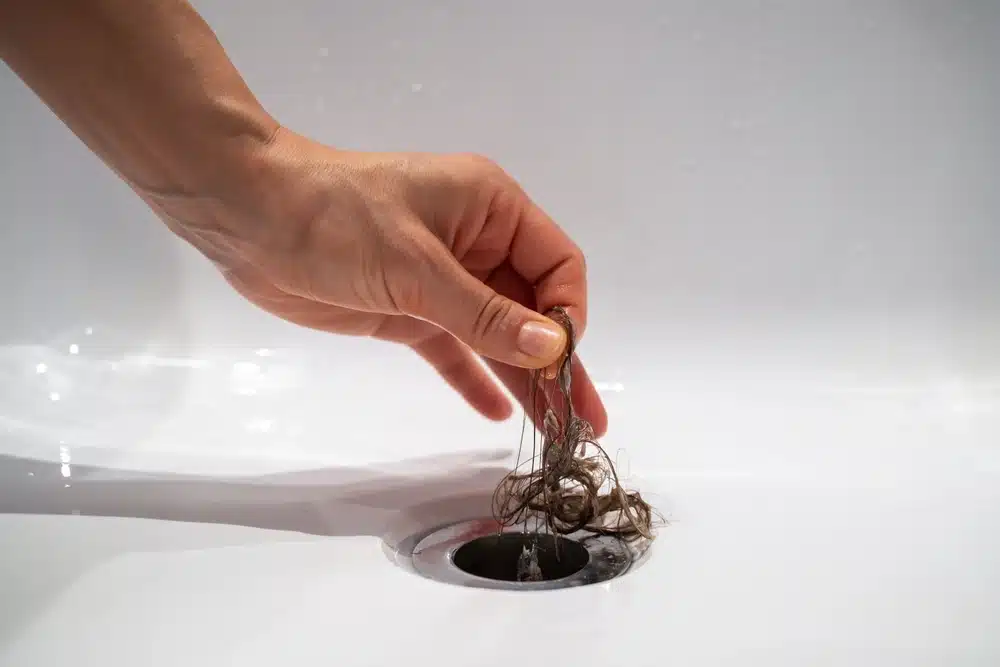Scalp psoriasis is a chronic autoimmune condition that causes scaly, itchy patches on the scalp. In some cases, it can even cause temporary hair loss. While there is no cure for scalp psoriasis, effective treatment options are available, including medications, home remedies, and lifestyle adjustments.
- What is Scalp Psoriasis? It’s an autoimmune condition that affects the scalp specifically, causing dry, itchy, flaky patches.
- What Causes Scalp Psoriasis? The exact cause of this autoimmune condition isn’t known. However, there are known flare-up triggers, including stress, diet, smoking, and trauma to the skin.
- Common Scalp Psoriasis Symptoms: Common symptoms of psoriasis include flaky patches, itching, soreness, a burning sensation, and redness around the scalp.
- What Are the Best Treatment Options for Scalp Psoriasis? Medical treatments include corticosteroids, salicylic acid, coal tar, and anthralin. Lifestyle adjustments can also help, such as adopting an anti-inflammatory diet and reducing stress. Home remedies such as aloe vera, apple cider vinegar, and olive oil can also help soothe flare-ups.
- Can Scalp Psoriasis Cause Hair Loss? Yes, scalp psoriasis can cause temporary hair loss in the area of the flare-up. The hair will grow back after the area has healed.
Do you have scalp psoriasis or show potential signs that you do? This chronic skin condition unfortunately has no cure. While it is not dangerous, it can seriously affect your self-confidence, especially if it contributes to hair loss.
The key to treating scalp psoriasis is first understanding it better, and that’s where this guide comes in. If you want to learn about the various causes, symptoms, and treatments for scalp psoriasis, keep reading.
What is Scalp Psoriasis?
First, let’s understand what psoriasis is. Psoriasis is a chronic autoimmune condition that causes the immune system to attack healthy skin cells. When this happens, the skin cells divide much quicker than they should, leading to a build-up of cells. It is like your body misfiring trying to cure something – the immune system believes these skin cells should be targeted to protect you, but it actually does the opposite. It results in thick, dry, scaly patches on the skin.
Scalp psoriasis is when psoriasis targets the scalp. Keep in mind, however, that many people with psoriasis experience symptoms in more than one part of the body, with the most common locations including the elbows, knees, lower back, and scalp.
What Causes Scalp Psoriasis?
Unfortunately, right now, there is no known cause for psoriasis. However, the National Psoriasis Foundation has a deeper understanding of how the immune system and genetics play a part in the role of psoriasis, as well as potential triggers. [1] These risk factors, in particular, make experiencing psoriasis more likely:
- Consuming Alcohol
- Being Obese
- Smoking Tobacco
- Being Highly Stressed
- Having Depression
- Having Another Autoimmune Disorder
- Having a Family History of Psoriasis
It’s important to note that not all people with psoriasis will fall under even a single one of these risk factors; it can happen to anyone.
Is Scalp Psoriasis Contagious?
No – there is no way one person can pass on psoriasis to another person. Skin-to-skin contact does not cause this skin condition.
Scalp Psoriasis Symptoms
Before treating psoriasis, it’s important to know the symptoms to look out for. Here are the most common symptoms of scalp psoriasis:
- Dry Scalp
- Raised Plaques (often white or silvery)
- Plaques on the Scalp, Hairline, Forehead, or Around the Ears
- Cracks and Bleeding
- Itchiness
- Scalp Flaking
- Thick Scales
- General Pain in the Affected Area
- Hair Loss
If you notice any of these symptoms, it’s best to book an appointment with a doctor or dermatologist, as diagnosing the problem is the first step to finding the best treatment options for you.
Experiencing Hair Loss? Download Our Hair Track App.
Diagnosing Scalp Psoriasis
Doctors often find diagnosing scalp psoriasis pretty straightforward (although it can then be difficult to treat). The doctor will examine the scalp carefully looking for signs, such as flaking or the presence of thick plaques. They will also talk to you about your medical history and your experience with the symptoms, such as when they started if they ever worsen, or if there is something that may trigger them.
Most doctors will want to be 100% sure of their diagnosis, so you may undergo a few simple tests. This is because there are a lot of crossover symptoms with other conditions, such as dandruff and eczema. These tests might include a biopsy and a blood test.
Treatments for Scalp Psoriasis
As mentioned before, there is no absolute cure for psoriasis. Treatment involves finding solutions that help manage the symptoms in the long term. Rest assured that many people find great treatment options that allow them to significantly minimise flare-ups, allowing them to live a healthy and normal life.
The four most common treatment options prescribed or recommended by doctors include the following.
Corticosteroids: These are steroids (synthetic hormones) that can reduce inflammation. You can use mild topical corticosteroids (such as medicated shampoos or a lotion) to target the scalp, which suppresses the immune system’s overactive response and reduces inflammation.
Salicylic Acid: Salicylic acid is a beta-hydroxy acid (BHA) that’s popular in skincare treatments, particularly for treating acne. [2] It is also effective at treating scalp psoriasis as it targets both the thick plaques and fine scaling by breaking away at these symptoms. The result is clearer, smoother scalp skin.
Coal Tar: As the name suggests, coal tar is a substance that comes from processing coal. It’s commonly used to treat skin conditions like psoriasis, as it has antibacterial properties that treat the irritation and soothe the area. You can get a coal tar shampoo for ease of use.
Anthralin: Anthralin is a medication specifically formulated to treat psoriasis. It slows down the accelerated production of skin cells, in turn reducing the production of scales and plaques on the scalp. You can find anthralin in a range of forms, including shampoos and ointments.
Lifestyle Changes
One of the ways many doctors recommend treating psoriasis is by changing your lifestyle. This works if there is a particular lifestyle trigger that causes more intense flare-ups.
Many people with psoriasis find their flare-ups are triggered by particular foods. So, by cutting out these inflammatory foods, individuals may be able to manage their symptoms better. Some of the most common foods that trigger psoriasis flare-ups include:
- Red Meat
- Dairy
- Processed Foods
- Alcohol
- Tomatoes
- Peppers
- Sugar
It can also help to eat an anti-inflammatory diet, which essentially means consuming more foods that have anti-inflammatory properties, such as spinach, olive oil, fatty fish, turmeric, dark chocolate, nuts, and kale.
Another lifestyle change would be to reduce stress, as stress can be a big trigger for scalp psoriasis flare-ups. Of course, this is easier said than done, but there are some helpful ways of combatting stress. For example, exercising more regularly, making more time for hobbies, getting outside more frequently, and attending counselling sessions.
Home Remedies
While it is typically best to treat psoriasis with the help of a doctor, there are also home remedies that can alleviate the uncomfortable symptoms.
Aloe Vera: Aloe vera is a substance found inside the plant and is commonly used to treat wounds. It works well for psoriasis, as it keeps the area more hydrated and reduces itchiness. It’s a soothing remedy that provides relief and can be applied as regularly as you like.
Apple Cider Vinegar: Apply cider vinegar can soothe the psoriasis by reducing itching.
Baking Soda: Baking soda can gently exfoliate the area, removing some of the flakes on the scalp. You need to mix some baking soda with water to form a paste – do not use it alone.
Coconut Oil: Coconut oil comes from coconuts. This natural oil is full of antibacterial and anti-inflammatory properties, which can be both soothing and healing on psoriasis scales and plaques.
Olive Oil: Another oil to use is olive oil, which is highly moisturising and can reduce itchiness.
Many individuals struggling with psoriasis choose to use a mix of both doctor-prescribed medications and home remedies.
Are There Other Types of Psoriasis?
Yes – scalp psoriasis is just one type. Others include:
- Pustular Psoriasis
- Plaque Psoriasis
- Guttate Psoriasis
- Inverse Psoriasis
- Erythrodermic Psoriasis
- Palmoplantar Psoriasis
- Nail Psoriasis
Keep in mind that there is a crossover between plaque and scalp psoriasis – if you have scalp psoriasis, it’s usually also plaque psoriasis, which is characterised by the presence of red raised patches and scales.
Can Scalp Psoriasis Cause Hair Loss?
Yes – some severe cases of scalp psoriasis can lead to hair loss, which happens due to the high levels of inflammation and excessive itching. Plus, thick scales can prevent hair follicles from growing new strands. The good news here is this type of hair loss is usually temporary, so the hair will grow back once the psoriasis has been treated.
What if Your Hair Loss Doesn’t Reverse?
In some cases, scalp psoriasis can lead to scarring alopecia, which means the hair follicles are permanently damaged and are unlikely to grow new hairs once more. This may be caused by a lot of scratching over a long period of time or particularly severe plaques that don’t go away.
In this case, it’s best to speak to a hair loss treatment specialist to see what your options are. The best treatment is always to target the underlying cause, which means finding a good psoriasis treatment option that works for your symptoms.
Is a Hair Transplant an Option?
A hair transplant is a surgical hair restoration solution that takes healthy follicles from one area of the scalp, known as the donor area, and then transplants them into the balding area, known as the recipient area.
Hair transplants are a fantastic way of regaining a full head of hair; however they are not usually a good option for those with hair loss caused by psoriasis. That’s because it’s hard for surgeons to operate on a scalp that has lots of flaking, scaling, and plaques. Plus, hair loss caused by psoriasis is usually temporary, so there is no point in surgery.
In some cases, scarring alopecia caused by psoriasis can be treated with a hair transplant, but this depends on the individual. It is always best to speak to a professional hair specialist before making any big decisions like this.
Scalp Psoriasis: Final Thoughts
We have now answered the most important questions related to scalp psoriasis, such as “What causes scalp psoriasis?” and “What’s the best psoriasis scalp treatment?”. This autoimmune condition may not seriously harm your health, but it can cause unpleasant and sometimes painful symptoms that affect your mental well-being. Remember that there are many treatment options out there to help you manage symptoms, including doctor-prescribed medications like corticosteroids as well as home remedies like aloe vera.
Are you experiencing hair loss unrelated to scalp psoriasis? At Harley Street Hair Clinic, we have a team of incredible hair specialists who have already helped multiple patients regain a full head of hair. To see the work we do, head over to our patients gallery.
Sources:
- https://www.psoriasis.org/causes/#:~:text=While%20scientists%20do%20not%20know,family%20history%20of%20the%20disease.
- https://www.healthline.com/health/skin/salicylic-acid-for-acne



